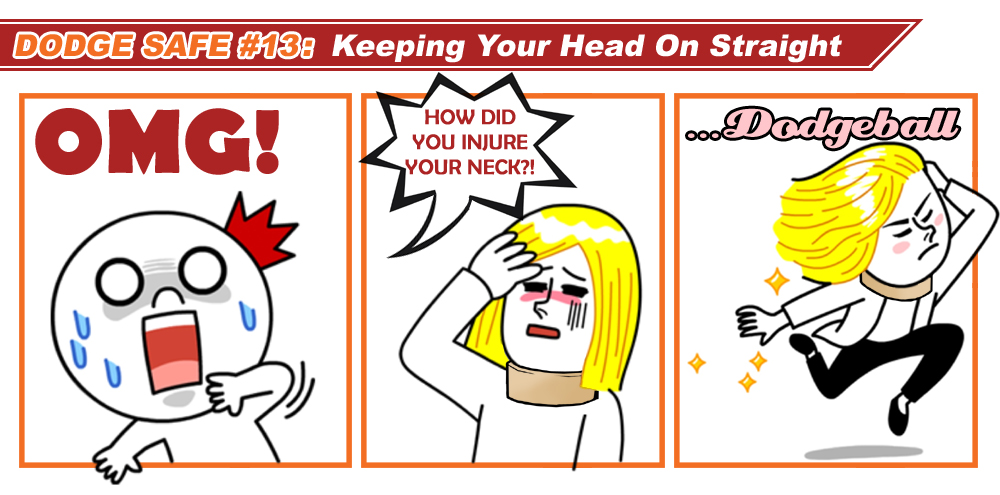Dodge Safe #13: Neck Stretches
Posted on April 09, 2014 at 6:19 pm |Have you ever been hit in the head by a dodgeball unexpectedly? While reffing? While sitting on a bench? Or walking off the court? Perhaps while talking to a friend on the sidelines? Or even while checking your phone?
Check. Check. Check. Check times a million! Of course you have! That’s because those are all very real and common occurrences at dodgeball events. When such hypotheticals become reality, the better you understand the nature of head and neck injuries, the better off you will be when dealing with the aftermath.
Neck Injuries in Dodgeball
Neck injuries can occur in dodgeball when a forceful impact, such as a 65 mph throw, causes the head and/or neck to suddenly snap backwards, forwards or sideways. The resulting injury is known as a neck muscle strain or whiplash (a non-medical term). Neck injuries typically happen when someone is struck unexpectedly by an outside force. Nevertheless, even a braced impact can result in injury if the speed and power of that force is great enough.
Figure A. Neck muscle strain caused by quick and sudden stretch of the muscles. Adapted from http://backandneck.about.com/od/conditions/tp/commoneckinjury.htm.
Symptoms of a neck muscle strain can include (Quinn, 2006):
-
Pain at the back, the sides, or even at the front of the neck
-
Headache at the back of the head
-
Stiffness or muscle rigidity
-
Decreased range of motion of neck (such as difficulty turning or tilting your head)
More severe symptoms of a neck muscle strain can include (Quinn, 2006):
-
Muscle spasms at the neck and/or upper regions of the shoulders and back
-
Tingling, numbness, or weakness in the hands or arms
Note: In a situation where a player does experience these more severe symptoms, it is advised to seek medical attention as soon as possible.
How to Treat a Pain in the Neck
For minor neck strains:
-
Rest. Avoid activities that may aggravate the neck pain.
(Eg. Taking a night off from dodgeball to recover before returning to activity.)
-
Heat. Application of warmth can help relax and loosen tight neck muscles.
(Heat packs or hot showers are great, accessible options)
-
Stretching. Stretches help to lengthen tight, irritated muscle tissue. Neck stretches can relieve neck and shoulder pain. However, it should be noted that aggressive stretching can actually worsen neck pain. Be sure to stretch GENTLY!
The following are examples of some daily neck stretches. It is recommended that each stretch be held for roughly 30 seconds and repeated 3 times per day.
|
A. Chin Tuck Adapted from www.hep2go.com |
|
|
B. Trapezius Stretch Adapted from www.hep2go.com |
|
|
C. Levator Scapula Stretch Adapted from www.hep2go.com |
|
Typically, neck strains should resolve themselves within 1-2 weeks. If there is no change or if the symptoms worsen, it is best to go to your doctor or consult a physiotherapist to get a thorough examination.
Carolyn Tam is a registered physiotherapist currently working in the Lower Mainland. She completed her Master of Physical Therapy degree at the University of British Columbia after graduating from UBC with a Bachelor of Human Kinetics.
References
Quinn, Elizabeth. (2006). Neck Sprain. Retrieved on April 4, 2014 from http://sportsmedicine.about.com/cs/neck/a/neck2.htm.
Shiel Jr., W.C. (n.d.). Neck Strain.Retrieved on April 4, 2014 from http://www.emedicinehealth.com/neck_strain/page3_em.htm#neck_strain_symptoms.






